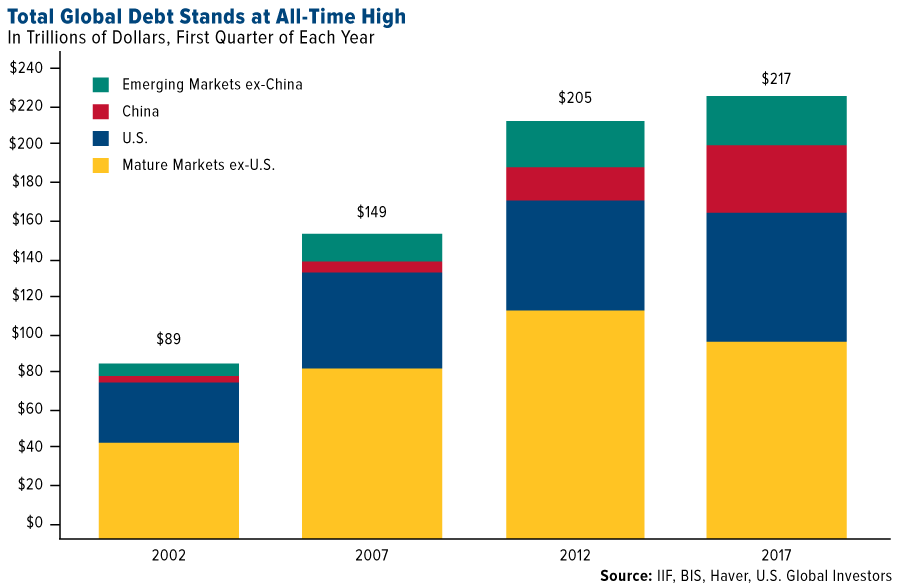There are all different types of bubbles popping up: bonds, vintage automobile, art and even shoes. Global debt levels is a MOAB, the mother of all bubbles.
Financial analysts and political pundits may have the United States national debt in their minds right now because it’s in the headlines again. However, the U.S. debt is a drop in the bucket when compared to the entire planet.
According to the latest numbers from Institute of International Finance (IIF), global debt levels topped $217 trillion in the first quarter of 2017 (U.S. debt is $20 trillion). And the Bank of International Settlements (BIS) is reporting that this figure may be understated by $13 trillion.

Since the global economic collapse, governments and central banks have ramped up excessive levels of debt, printed vast sums of cash and have spent like there’s no tomorrow. But what happens when the next financial crisis hits the world? There’s nothing left they can do except destroy their currencies.
The U.S., China, Europe and Japan have all been racking up debt.
U.S. Global Investors CEO Frank Holmes finds it a frightening scenario:
“It goes without saying that this is a huge risk. Some are calling this mountain of debt ‘the mother of all bubbles,’ and we all remember how the last two bubbles ended, in 2000 (the tech or dotcom bubble) and 2007 (the housing bubble).”
Consumers are also facing astronomical levels of debt, returning to pre-recession norms. U.S. credit card debt, for instance, is set to top $1 trillion this year. Of course, you can’t omit other instruments of debt: lines of credit, home equity lines of credit (HELOC), auto loans, student loans and so on.
When interest rates creep up, it’s going to put a greater strain on government. In the U.S., the U.S. will eventually only be able to afford paying interest on the debt, Social Security and some parts of government.
“When interest rates creep up, it’s going to put a greater strain on government. In the U.S., the U.S. will eventually only be able to afford paying interest on the debt, Social Security and some parts of government.”
All the U.S. government will do is raise taxes. I pay zero federal tax on $20,000 of income and when i start my SS benefit at 62 next year I will not pay any tax on it.
I paid $520 in federal tax on $8,200 income in 1980. What makes anyone think the government will not raise tax rates in the future? They could very easily come up with a minimum tax say an additional $1000 for every $20,000 of income that everyone would have to pay. That would raise billions. In a 16 trillion dollar economy there are many ways the government could tax the citizens to get the needed revenue. VAT is the first tax that comes to mind.